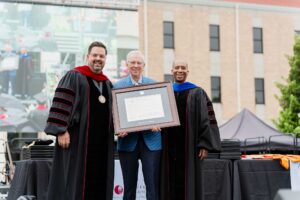

Editor’s note: This is an adapted excerpt from “A Psalm for Unseen Servants” to be released by B&H Publishing Group June 3. Hance Dilbeck is president of GuideStone Financial Resources.
“Acknowledge” is a powerful word, defined as “to recognize the rights, authority or status of; to express gratitude or obligation for.” The apostle Paul models that art of recognition in Romans 16. He shows us how easy, yet powerful it is when we acknowledge those who are working hard serving Jesus and His Church.
We should recognize people for their deeds. Time is short for Paul and this acknowledgment list is compressed. However, he makes the time to mention the specific activities of many servants. Paul seems particularly interested in hard work, hospitality and service. These three activities sustain ministry in the Kingdom. The people who stand in front of the room to lead worship and proclaim God’s Word each Sunday are infinitely valuable. But a church or ministry will not last long, regardless of the quality of the men behind the pulpit, without the saints who are willing to serve faithfully behind the scenes. You may have one who preaches in a way that is faithful and piercing while drawing great multitudes like Adrian Rogers, W.A. Criswell or Charles Spurgeon. But the crowds won’t keep coming if there are no audio people to project the sound, financial secretaries to count and deposit the offering or if there are no janitors ensuring well-stocked and clean, sanitary restrooms.
Consider hospitality as the epitome of unseen service. Hospitality is a theme in this list of servants and service in Romans 16. Hospitality takes time and money. It is often unappreciated; yet, hospitality is essential for the church to gather, to fellowship and to grow together. Those who serve the church by preparing a room, preparing their home, preparing a meal, and making people feel welcome are practicing hospitality. These unseen servants ought to be acknowledged with gratitude and respect.
As a pastor, I came to church early on Sunday morning and left late. But somehow, there were always some people there before me and some dear saints who left after me. They were working hard, serving behind the scenes, preparing and providing hospitality — food service, custodians and nursery workers.
Ministry is hard work. Paul mentions this repeatedly and every faithful servant of Christ’s church would say a loud Amen! Committed Christian servants work hard. Sometimes some well-meaning church member will comment about how wonderful it must be to serve vocationally in a church as if it’s only preaching and meeting members for lunch! I don’t know why it surprises us when serving in a church or ministry is difficult. We have an enemy, and it’s not the deacons or the finance committee. Satan will be there to attack us. The father of lies will sow bitterness and greed, which will affect the work. That makes it hard work. I once served with a minister of music who referred to Christian ministry simply as “the work.” No matter your role, it is work; and often it will be hard. But still, there is glory in hard work.
Pastors should remember the unseen servants in multi-staff churches[JW1] . It can be easy to be lulled into complacency when a great team surrounds you. The food service team ensures the coffee is tasty, hot and in the right place at the right time each week. Meals for key meetings are ready at the right time and in the right quantity. The nursery workers are ready to go when the first child arrives. The A/V staff, working with a system held together with duct tape and baling wire, continues to excel. It can quickly become easy to just take their work for granted; that they are just “doing their job.” And while it is true that they are doing their job — and should want to do their job with excellence — as managers, it is important to recognize the work of those rowing with the team just as we would seek to correct those rowing against the team.
Recognize the work of people and their deeds. Also, recognize the details of their service. No doubt, there were many details of which Paul is clearly unaware. His travels, his writing and his time in prison all meant that he would be unaware of some of the work. Some of these saints receive a kind of blanket recognition. But, when Paul knew some detail of their service, he put it in the spotlight. Phoebe had helped Paul. Priscilla and Aquila had risked their own necks, Epaenetus was the first convert in Asia. Mary worked hard. Paul mentions details.
When we mention details, we let people know that we are paying attention to their work — which is often surprising to them that we noticed. Acknowledging details is a powerful way to say, “Your work matters.” The unseen servant often grows discouraged when she suspects no one really appreciates her extra effort or remarkable consistency. When we mention details, we are saying, “We see you.”


























